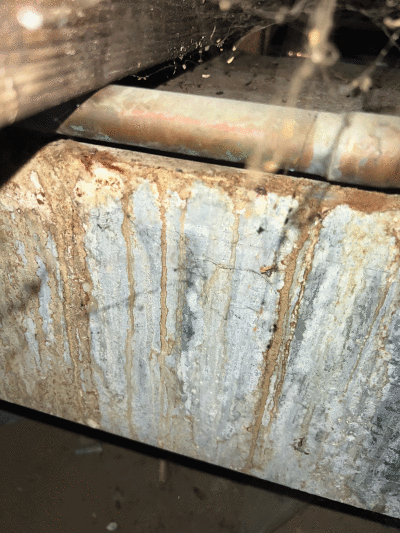
Brynn Cooksey, general manager with Air Doctors Heating and Cooling Co., responded to a home for this frozen pipe.
Photo provided by Brynn Cooksey
METRO DETROIT — The winter in metro Detroit can be rough at times, especially when it comes to freezing temperatures.
One problem homeowners typically face during this period is frozen pipes, which leads to breaks that can cost thousands of dollars to repair.
According to the American Red Cross, frozen pipes can be caused by exposure to severe cold, and that cold most often affects outdoor hose bibs, swimming pool supply lines and water sprinkler lines; water supply pipes in unheated interior areas like basements and crawl spaces, attics, garages, or kitchen cabinets; and pipes that run against exterior walls that have little or no insulation.
Brynn Cooksey, the general manager with Air Doctors Heating and Cooling Co., which serves all of metro Detroit, said his business gets calls daily regarding busted pipes during the winter. From what he’s seen, a home’s heating system usually suffers a failure that causes the broken pipes.
“We recommend customers get annual tune-ups on their heating system, and then we recommend getting a Wi-Fi-based smart thermostat that will notify the homeowner or building occupant that the temperatures are dropping so that you can get service quickly,” he said.
When a pipe does break, Cooksey said the section will be removed and replaced. He said that he’s seen busted pipes that have cost homeowners $30,000 to $40,000 in damages.
“The repairs can be costly, but also the cleanup and insurance claims and stuff like that can be pretty costly as well,” he said.
Metro Detroit recently had a particularly cold period around Christmas.
Ferndale Department of Public Works Director Dan Antosik said the city received more than a dozen calls regarding pipes that had burst or meters that had frozen because of the weather. There also were instances of vacant homes that had pipe issues that didn’t get reported until later.
Typically, by the time the city finds out about the pipes, Antosik said, the issue is that the home needs to have its water turned off.
“Usually, when it comes to freezing pipes, we’re shutting off the water, we’re swapping out the water meter because the property owner is responsible for their water lines on the property side of things,” he said. “A lot of times, that’s them calling a plumber, getting the pipes fixed, or it’s a plumber getting the pipes fixed and a company to do some restoration work in terms of cutting out drywall that got wet, replacing sections of the floor or so on.
“The water service lines — rarely do we see this — but if those aren’t buried deep enough, those will freeze. And that’s an instance where the city has to go out and get that line thawed out,” he continued.
With vacant properties in Ferndale, Antosik said the heat gets shut off for the winter because no one’s using the home or the owners have gone out of town on vacation and the temperature has been dialed down too low.
For homes with crawl spaces, homeowners need to make sure that those areas are well insulated or have an air duct that’s blowing heat into the crawl space.
“If someone’s going out of town, keep the heat at maybe 60 degrees or something instead of turning it down too low where they are susceptible to freezing pipes,” he said. “Another thing that people can do is just slowly run the water, maybe in the kitchen sink or something like that, to make sure that that water is constantly running through the pipes, because that won’t freeze that way.”
Antosik noted that owners who plan to be out of town over the winter can contact the city to shut off their water to avoid frozen pipes.
Before cold weather hits, the American Red Cross advises homeowners to drain water from swimming pool and sprinkler supply lines, and to not put antifreeze in them unless directed; to remove, drain and store hoses used outdoors, and to close inside valves supplying outdoor hose bibs; and to add insulation to attics, basements and crawl spaces.
To thaw frozen pipes, owners can apply heat to the section using an electric heating pad wrapped around the pipe, an electric hair dryer or a portable space heater that’s kept away from flammable materials. They can also wrap pipes with towels soaked in hot water. It’s advised that people shouldn’t use a blowtorch, a kerosene or propane heater, a charcoal stove, or any other open-flame device.
For more information and tips from the American Red Cross, visit www.redcross.org/get-help/how-to-prepare-for-emergencies/types-of-emergencies/winter-storm/frozen-pipes.html.
 Publication select ▼
Publication select ▼





















